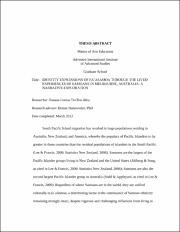| dc.description.abstract | South Pacific Island migration has resulted in large populations residing in Australia, New Zealand, and America, whereby the populace of Pacific Islanders is far greater in those countries than the residual populations of islanders in the South Pacific (Lee & Francis, 2009; Statistics New Zealand, 2006). Samoans are the largest of the Pacific Islander groups living in New Zealand and the United States (Ahlburg & Song, as cited in Lee & Francis, 2009; Statistics New Zealand, 2006); Samoans are also the second largest Pacific Islander group in Australia (Stahl & Appleyard, as cited in Lee & Francis, 2009). Regardless of where Samoans are in the world, they are unified culturally in fa‘aSamoa, a determining factor in the continuance of Samoan ethnicity remaining strongly intact, despite vigorous and challenging influences from living in
Western societies. Given the duration of Samoan migration and residency in Australia, there has been little research concerning migrant adjustment, acculturation experiences, and adaptation upon the ethnic and spiritual identities of Samoan people, or how the dynamics of fa‘aSamoa and Australian culture have affected Samoan migrants and their succeeding generations. This study seeks to examine factors that consequentially affect the ethnic and spiritual identities of two Samoan families (traditional and contemporary), with three generations of family members. The purpose of the study was to discover the ethnic identity processes and elucidate on the spiritual identity formation of Samoan migrants, their children, and grandchildren. Using a theoretical perspective to critically explore the identity processes, the Life Story Identity model utilizing narrative inquiry was employed to examine how social, cultural, historical, and psychological influences have impacted Samoan intergenerational identities within their social world. The findings revealed that when Samoan identity (Samoan cultural practices and values) is established with grandparents in the homeland before migration, fa‘aSamoa remains strong from first to third generation. However, when Samoan identity is only partially established before migration, parents who migrated when single and had their children in a foreign country tend to retain only the Samoan values. In addition, spiritual identity established in first generation parents is a strong predictor of spiritual identity formation in their second generation children, particularly when children witness faith experiences of their parents. The study ventures to add to the discourse of psychological research towards an understanding of the dynamics of change, and the maintenance or loss of traditional cultures pertaining to the well being of migrants and their families residing in host countries. | en_US |

